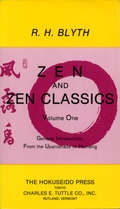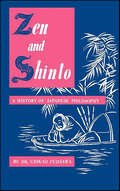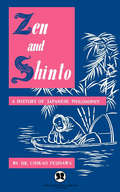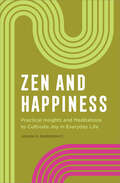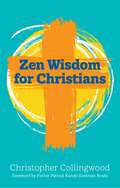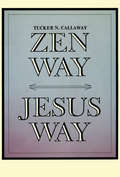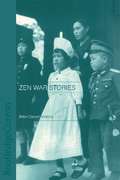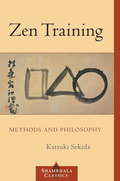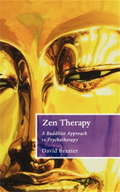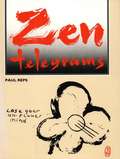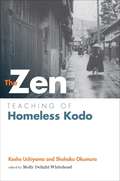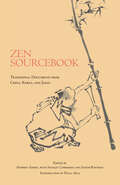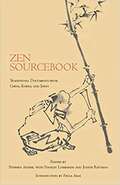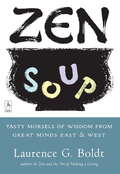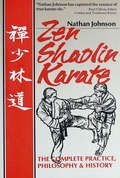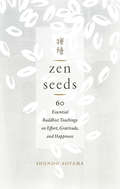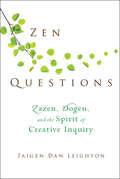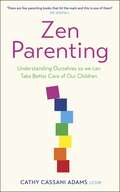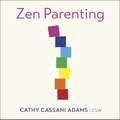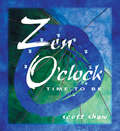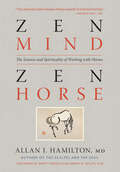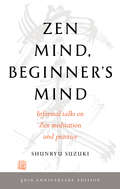- Table View
- List View
Zen and Zen Classics volume 1
by R. H. BlythThis is not a dry scholarly book on Zen.It is a fascinating introduction into a study of self-enlightenment and inner reason that has been a driving force of all Japanese culture. Written by Reginal Horace Blyth (1898-1964) this is a volume free of the dry pedantry that has hobbled so many well meaning French and English studies of Zen. It is free also of the breathless mystery-mongering that unfortunately has bloated American Zen.Blyth reads easily. The questions he poses; the views he offers....all lead to a sense of inner self and an awakening ofan awareness of the surrounding universe and one's relationshipto it.After discussing "What is Zen?" (and what isn't) Blyth sketches a history of Zen dating from 1000 B.C. to715A.D., the year of the death of the Sixth Patriarch, Huineg. With a historical background thus established, Blyth next providestranslations and commentary on some of the most important and basic Zen literature in existence. For the Zen initiate then, this book is an excellent beginning. For the practitioner, further meaningful revelations await.
Zen and Shinto: A History of Japanese Philosophy
by Dr. Chikao FujisawaThis history of Japanese philosophical traditions underscores the importance of Zen and Shinto to the development of Japanese culture. How do the Japanese talk about their native philosophy, Shinto, so many years after the Western Allies abolished it as a state religion? What is its relationship to Buddhism, and particularly to Zen? How modern can this very ancient creed ever be? These are some of the questions considered in this analytic work by Dr. Chikao Fujisawa, who specializes in the study of traditional Japanese philosophy and its effect on modern society. Fujisawa&’s work is not only a survey of Zen and Shinto, but also an impassioned plea to restore Shinto as the very substance of Japanese life and thought. At the same time, Zen and Shinto offers new insight into the depth and vitality of Japanese culture, demonstrating its remarkable capacity to assimilate foreign thought and ideas, and thus contribute to the world&’s hope for permanent peace.
Zen and Shinto
by Dr Chikao FujisawaHow do the Japanese talk about their native philosophy, Shinto, a decade and a half after the Western Allies abolished it as a state religion? What is its relationship to Buddhism, and particularly to Zen? How modern can this very ancient creed ever be? These are some of the questions considered in this study by Dr. Chikao Fujisawa, who specialized in the study of traditional Japanese philosophy and its effect on modern society. Zen and Shinto is a strong plea to rectify the steps taken to eradicate Shinto, the very substance of Japanese life and thought. At the same time, it offers new insight into the amazing adaptability of the Japanese psyche--its depth, vitality and universality--and its remarkable capacity to assimilate foreign thought and ideas, and thus contribute to the world's hope for permanent peace.
Zen and Happiness: Practical Insights and Meditations to Cultivate Joy in Everyday Life
by Joshua R. PaszkiewiczHone your Zen practice and harness joy Life is filled with thrilling highs, crushing lows, and everything in between. But often, we spend too much time planning for and reacting to our experiences, rather than simply "being" in them. This thoughtful guide shows you how to integrate Zen traditions into your daily life so you can focus on letting go, being present, and finding bliss in the moment. What makes this a standout among Zen books: Get an insight into Zen—Learn about the foundations of Zen as you delve into its Buddhist roots, investigate a beginner's mind, and gain greater awareness of how the practice spurs self-reflection. Redefine happiness—Through the lens of Zen Buddhism, see how mindfulness observations can help you achieve greater contentment. Develop a practice—Discover a range of exercises to help you put the principles of Zen into practice, from mindful eating to walking meditations. Cultivate happiness through regular Zen practice with help from this insightful guide.
Zen Wisdom for Christians
by Christopher CollingwoodAs spiritual paths, Zen and Christianity can learn from one another. In this book, Anglican priest and Zen teacher Christopher Collingwood sets out how Zen can return Christians to their roots with renewed energy, and allow others to consider Christianity in a new and more favourable light. For the many Christians searching for a greater depth of spirituality, Zen offers a way to achieve openness. Drawing on Zen experience and the teachings of Jesus as depicted in the gospels, Zen Wisdom for Christians enables Christians to explore avenues of thought and experience that are fresh and creative. Using examples of Zen koans and Zen readings of Christian texts, the author provides a radical reorientation of life - away from one based on self-centredness and the notion of a separate, isolated self, to a way that is inclusive and at one with all.Zen Wisdom for Christians proves that the practice of Zen can lead Christians towards deeper spirituality and enhance religious experience through mutual appreciation, in a way that is truly eye-opening and life-changing.
Zen Way - Jesus Way
by Tucker N. CallawayThis groundbreaking book successfully fuses the two overlapping traditions of Zen Buddhism and Christianity.Very few Christians who are interested in Zen Buddhism understand the fundamentals of the religion itself. <P><P>Most of the books which are available on Zen are superficial and fraught with caricatures and erroneous generalizations - concentrating more on meditation than on the real essence of Zen. Now the Christian who has been waiting for a clear and thorough explanation of Zen in terms he can understand has been provided with Zen Way--Jesus Way--a unique inside look at Christianity and Zen Buddhism by Dr. Tucker N. Callaway, a committed Christian missionary who for twenty years has practiced zazen in Japanese temples in an effort to reach the heart of the faith.Calloway has a knack for making philosophical concepts clear to the general reader and begins Zen Way--Jesus Way by presenting the fundamental presuppositions of Zen and several of the concepts which are logically deduced from them. Next he relates some of his experiences in Buddhist temples, while explaining the practical applications of Zen philosophy. Finally he interprets the Jesus Way in a manner that makes possible a genuine comparison with the Zen way.
Zen War Stories (Routledge Critical Studies in Buddhism)
by Brian VictoriaFollowing the critically acclaimed Zen at War (1997), Brian Victoria explores the intimate relationship between Japanese institutional Buddhism and militarism during the Second World War.Victoria reveals for the first time, through examination of the wartime writings of the Japanese military itself, that the Zen school's view of life and death was deliberately incorporated into the military's programme of 'spiritual education' in order to develop a fanatical military spirit in both soldiers and civilians. Furthermore, that D. T. Suzuki, the most famous exponent of Zen in the West, is shown to have been a wartime proponent of this Zen-inspired viewpoint which enabled Japanese soldiers to leave for the battlefield already resigned to death. Victoria takes us onto the naval battlefield in the company of warrior-monk and Rinzai Zen Master Nakajima Genjô. We view the war in China through the eyes of a Buddhist military chaplain. The book also examines the relationship to Buddhism of Japan's seven Class-A war criminals who were hung by the Tokyo War Crimes Tribunal in 1948.A highly controversial study, this book will be of interest, first and foremost, to students of Zen as well as all those studying the history of this period, not to mention anyone concerned with the perennial question of the 'proper' relationship between religion and the state.
Zen Training: Methods and Philosophy
by Katsuki SekidaZen Training is a comprehensive handbook for zazen, seated meditation practice, and an authoritative presentation of the Zen path. The book marked a turning point in Zen literature in its critical reevaluation of the enlightenment experience, which the author believes has often been emphasized at the expense of other important aspects of Zen training. In addition, Zen Training goes beyond the first flashes of enlightenment to explore how one lives as well as trains in Zen. The author also draws many significant parallels between Zen and Western philosophy and psychology, comparing traditional Zen concepts with the theories of being and cognition of such thinkers as Heidegger and Husserl.
Zen Therapy: A Buddhist approach to psychotherapy
by David BrazierBuddhism, from Abhidharma to Zen, offers a practical path to harmony of head and heart. For over 2,000 years Buddhists have been developing sophisticated psychologies to guide the work of achieving freedom from mental suffering. Now East and West are beginning to learn from each other. In a readable and practical manner, this book challenges basic assumptions of Western psychology, demystifies Buddhist psychology and presents Zen as a therapy. Giving examples of its effectiveness in psychotherapeutic practice, the author shows how Zen derives from the Buddhist theory of the mind and throws new light upon the Buddhist theory of relations and conditions. This seminal wok is a resource full of intriguing and controversial ideas.
Zen Therapy: A Buddhist approach to psychotherapy
by David BrazierBuddhism, from Abhidharma to Zen, offers a practical path to harmony of head and heart. For over 2,000 years Buddhists have been developing sophisticated psychologies to guide the work of achieving freedom from mental suffering. Now East and West are beginning to learn from each other. In a readable and practical manner, this book challenges basic assumptions of Western psychology, demystifies Buddhist psychology and presents Zen as a therapy. Giving examples of its effectiveness in psychotherapeutic practice, the author shows how Zen derives from the Buddhist theory of the mind and throws new light upon the Buddhist theory of relations and conditions. This seminal wok is a resource full of intriguing and controversial ideas.
Zen Telegrams
by Paul RepsZen Telegrams is a collection of Reps's picture-poems," works of calligraphic art and minimalist poetry that first fascinated Japanese,then attracted Western viewers. A lesser artist trying to combine English text and Eastern art might have failed, but Reps was a rare talent, accomplished in a wide variety of literary genres and art forms and his unique work appeals to a universal audience.
Zen Telegrams
by Paul RepsZen Telegrams is a collection of Reps's picture-poems," works of calligraphic art and minimalist poetry that first fascinated Japanese,then attracted Western viewers. A lesser artist trying to combine English text and Eastern art might have failed, but Reps was a rare talent, accomplished in a wide variety of literary genres and art forms and his unique work appeals to a universal audience.
Zen Teaching of Homeless Kodo
by Shohaku Okumura Kosho Uchiyama Roshi Jokei Molly WhiteheadAbandon your treasured delusions and hit the road with one of the most important Zen masters of twentieth-century Japan.Eschewing the entrapments of vanity, power, and money, "Homeless" Kodo Sawaki Roshi refused to accept a permanent position as a temple abbot, despite repeated offers. Instead, he lived a traveling, "homeless" life, going from temple to temple, student to student, teaching and instructing and never allowing himself to stray from his chosen path. He is responsible for making Soto Zen available to the common people outside of monasteries. His teachings are short, sharp, and powerful. Always clear, often funny, and sometimes uncomfortably close to home, they jolt us into awakening. Kosho Uchiyama expands and explains his teacher's wisdom with his commentary. Trained in Western philosophy, he draws parallels between Zen teachings and the Bible, Descartes, and Pascal. Shohaku Okumura has also added his own commentary, grounding his teachers' power and sagacity for the contemporary, Western practitioner. Experience the timeless, practical wisdom of three generations of Zen masters.
Zen Sourcebook: Traditional Documents from China, Korea, and Japan
by Stanley Lombardo Stephen Addiss Judith Roitman"Featuring a carefully selected collection of source documents, this tome includes traditional teaching tools from the Zen Buddhist traditions of China (Ch'an), Korea (Son), and Japan (Zen), including texts created by women. The selections provide both a good feel for the varieties of Zen and an experience of its common core. . . . The texts are experiential teachings and include storytelling, poetry, autobiographies, catechisms, calligraphy, paintings, and koans (paradoxical meditation questions that are intended to help aspirants transcend logical, linguistic limitations). Contextual commentary prefaces each text. Wade-Giles transliteration is used, although Pinyin, Korean, Japanese, and Sanskrit terms are linked in appendixes. An insightful introduction by Arai contributes a religious studies perspective. The bibliography references full translations of the selections. A thought-provoking discussion about the problems of translation is included. . . . Summing Up: Highly recommended. All levels." --Choice
Zen Sourcebook: Traditional Documents From China, Korea, And Japan
by Stanley Lombardo Stephen Addiss Judith Roitman Paula Arai"Featuring a carefully selected collection of source documents, this tome includes traditional teaching tools from the Zen Buddhist traditions of China (Ch'an), Korea (Son), and Japan (Zen), including texts created by women. The selections provide both a good feel for the varieties of Zen and an experience of its common core. . . . The texts are experiential teachings and include storytelling, poetry, autobiographies, catechisms, calligraphy, paintings, and koans (paradoxical meditation questions that are intended to help aspirants transcend logical, linguistic limitations). Contextual commentary prefaces each text. Wade-Giles transliteration is used, although Pinyin, Korean, Japanese, and Sanskrit terms are linked in appendixes. An insightful introduction by Arai contributes a religious studies perspective. The bibliography references full translations of the selections. A thought-provoking discussion about the problems of translation is included. . . . Summing Up: Highly recommended. All levels." --Choice
Zen Soup (Compass)
by Laurence G. BoldtIf, as the I Ching says, thoughts are spirits, then this collection of highly distilled thoughts from history?s greatest philosophers and religious figures will certainly put you in good spirits. <P><P>Laurence Boldt has long made a practice of applying Zen principles to everyday life. Here he applies wisdom from all corners of the world to twenty-five aspects, or qualities, associated with the Zen tradition. The result is a soup of the most hearty and wholesome kind, well-seasoned with age, and filled with delicious surprises: ?Where your talents and the needs of the world cross, thence lies your vocation.? --Aristotle ?A man with outward courage dares to die: A man with inward courage dares to live.? --Lao Tzu You?ll also find Flip Wilson on living in the moment; Will Rogers on the beginner?s mind; Helen Keller on courage; Chekhov on self-confidence; and Colette on joy. Each chapter includes an entertaining and informative essay that explains the principle and its application to Zen wisdom. The rest is up to you. Read it in one gulp or savor each morsel. Either way, Zen Soup is sure to whet your spiritual appetite as it nourishes your soul.
Zen Shaolin Karate
by Nathan JohnsonIn Zen Shaolin Karate, Johnson explains and illustrates in precise detail every subtle movement of two of karate's most common kata, and provides historical testimony for his explanations by integrating his findings with Zen philosophy. The author's unique interpretations of the Nai Fuan Chin and Saam Chin kata will destroy the barriers separating karate, kung fu, and aikido, and will revolutionize how kata are applied in all karate styles.
Zen Shaolin Karate
by Nathan JohnsonIn Zen Shaolin Karate, Johnson explains and illustrates in precise detail every subtle movement of two of karate's most common kata, and provides historical testimony for his explanations by integrating his findings with Zen philosophy. The author's unique interpretations of the Nai Fuan Chin and Saam Chin kata will destroy the barriers separating karate, kung fu, and aikido, and will revolutionize how kata are applied in all karate styles.
Zen Seeds: 60 Essential buddhist Teachings on Effort, Gratitude, and Happiness
by Shundo AoyamaFrom a living treasure of Japanese Zen, an inspiring collection of teachings about the power of Buddhist practice to help you transform suffering and touch the marrow of your life.In this sparkling collection of teachings, Japanese Zen master Shundo Aoyama Roshi offers an entry to the authentic practice of Zen Buddhism. Or, rather, she offers a myriad of entries—for Zen Seeds, as its title suggests, is comprised of brief chapters meant to plant seeds of wisdom and compassion in readers. Ranging from classical Zen sources, such as the teachings of Dogen and the encounter stories of the koans, to anecdotes from Aoyama’s fascinating life and from those of her many students, the book paints a profoundly compelling portrait of the transformative possibilities of Zen. A pioneering female leader in the Soto Zen school, Aoyama Roshi demonstrates the power of practice for anyone seeking to lead a life of greater conviction and spiritual nourishment.
Zen Questions
by Taigen Dan LeightonWhether speaking of student or master, Zen hinges on the question. Zen practice does not necessarily focus on the answers, but on finding a space in which we may sustain uncertainty and remain present and upright in the middle of investigations. Zen Questions begins by exploring "The World of Zazen,"--the foundational practice of the Zen school--presenting it as an attitude of sustained inquiry that offers us an entryway into true repose and joy. From there, Leighton draws deeply on his own experience as a Zen scholar and teacher to invite us into the creativity of Zen awareness and practice. He explores the poetic mind of Dogen with the poetry of Rumi, Mary Oliver, Gary Snyder, and even "the American Dharma Bard" Bob Dylan. What's more, Leighton uncovers surprising resonances between the writings of America's Founding Fathers--including Thomas Jefferson and Ben Franklin--and the liberating ideals at the heart of Zen.
Zen Parenting: Understanding Ourselves so we can Take Better Care of Our Children
by Cathy Cassani Adams'There are few parenting books that hit the mark and this is one of them!' Dr ShefaliWe can't always plan for what's next - that's been made more and more clear in the past few years. The truth is that life is never predictable, especially for parents. What is possible is an unlimited capacity for compassion and caring - for yourself and your children. As you navigate the uncertainty with openness and humility, you find the clarity, connection, and community that is Zen Parenting. Using the seven chakras, therapist Cathy Cassani Adams discusses parenting issues such as school pressure, self-care, emotional intelligence, anxiety, sexuality and gender, and more, while offering concrete examples and strategies to help you wake up to your life as a parent. Zen Parenting guides you to:- Establish your physical, emotional and mental foundation- Practice creativity and how to access your emotions- Develop your sense of self and allow your kids to do the same- Experience openheartedness, empathy and compassion- Discover genuine and meaningful communication- Explore mindfulness, meditation and your own intuition- Connect to something greater than yourself
Zen Parenting: Understanding Ourselves so we can Take Better Care of Our Children
by Cathy Cassani AdamsAn audiobook that helps parents to pay attention to daily life and the relationships they are creating with their children.We easily fall into the trap of parenting without a real awareness of what we're doing and why we're doing it, invariably using other peoples' ideas and values or outdated child-rearing techniques.A Zen Parent, is not a label or prescriptive way to parent, but a willingness to stay present with what's happening and do the right thing. It's a commitment to an imperfect practice of continual self-awareness so we can show up for our children in an authentic and mindful way. The one thing that can be counted on throughout parenting is change - just when we understand our child's experience or buy the right size clothes, they change and grow. Just when we get comfortable with typical life challenges, the world experiences a global pandemic. Being able to parent and live well requires a willingness to get comfortable with disorder and uncertainty, and even more of a willingness to be introspective and creative to once again find reorder.Structured through the 7 bodily chakras, which are used as a framework for human existence, this book is for parents who want to raise their children in a more self-aware and mindful way, to expand their thinking about who they are and what they want to share with their kids. It's a self-study and reminder to pay attention to daily life and the relationships they are creating with their children. And it's an opportunity to live what they want their kids to learn, to show up as themselves so their kids know they can do the same.(P) 2022 Hachette Audio
Zen O'Clock: Time to Be
by Scott ShawA new way to look at clocks and calendars—and learn to live more peacefully in the present. Imagine being able to step beyond the controlling hands of clocks, calendars, and schedules to discover the mystical process that will give you an entirely new perspective of time. Inside this book are insightful aphorisms that will help you live more peacefully in the present. With each page, Scott Shaw, an expert in meditative consciousness, helps you throw away phrases like &“wasted time&” and &“time constraints&”—and understand the difference between what time is and what we perceive it to be. Imagine, right now, time in your hands!
Zen Mind, Zen Horse: The Science and Spirituality of Working with Horses
by Allan J. Hamilton“Far more than a book about how to care for a horse, though it stands out as one of the best on the subject . . . beautiful” (Susan Richards, author of Chosen by a Horse). This unique guide to horsemanship incorporates Eastern philosophy to describe how horses understand and respond to the flow of vital energy around them, and how they use this energy, called chi, to communicate with their herd, express dominance, and sense predators. Written by the award-winning author of The Scalpel and the Soul, and including forewords by Monty Roberts and Dr. Robert Miller, Zen Mind, Zen Horse shares safe, simple techniques to make you more receptive to your animal’s chi, so you can develop a calm and effective training style that will not only help your horse follow commands, but strengthen the spiritual bond between horse and rider.
Zen Mind, Beginner's Mind: 50th Anniversary Edition
by Shunryu SuzukiNamed one of the 100 Best Spiritual Books of the Twentieth Century (Spirituality & Practice)A 50th Anniversary edition of the bestselling Zen classic on meditation, maintaining a curious and open mind, and living with simplicity."In the beginner's mind there are many possibilities, but in the expert's there are few."So begins this most beloved of all American Zen books. Seldom has such a small handful of words provided a teaching as rich as has this famous opening line. In a single stroke, the simple sentence cuts through the pervasive tendency students have of getting so close to Zen as to completely miss what it's all about. It is an instant teaching on the first page--and that's just the beginning.In the fifty years since its original publication, Zen Mind, Beginner's Mind has become one of the great modern spiritual classics, much beloved, much reread, and much recommended as the best first book to read on Zen. Suzuki Roshi presents the basics--from the details of posture and breathing in zazen to the perception of nonduality--in a way that is not only remarkably clear, but that also resonates with the joy of insight from the first to the last page.
